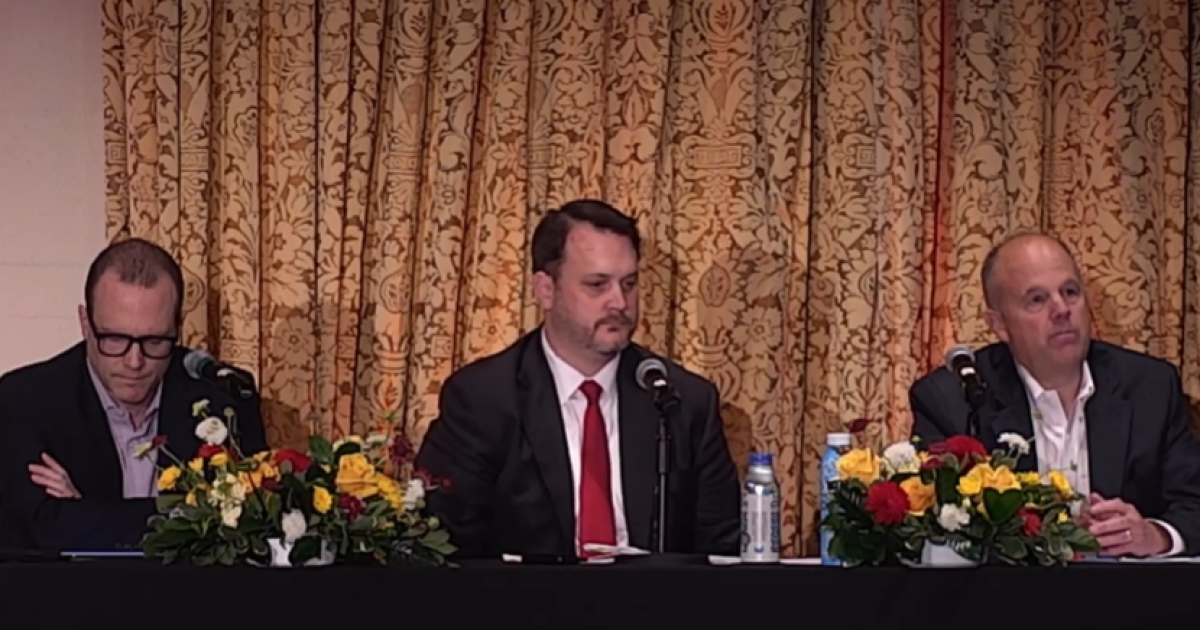CBIZ and Mayer Hoffman McCann had been operating under an alternative practice structure long before many other firms began adopting one, but the acquisition last year of Marcum LLP prompted a name change and a number of adjustments.
Last July, Cleveland-based CBIZ announced it would be acquiring New York-based Marcum in a $2.3 billion megadeal between two Top 25 Firms. CBIZ is a publicly traded company, but has been affiliated with the CPA firm Mayer Hoffman McCann in an alternative practice structure since 1998. MHM spun off its tax and consulting practice that year and merged it with Century Business Services Inc., which became known as CBIZ Inc., while the audit practice retained the Mayer Hoffman McCann name and was often referred to as CBIZ MHM. Last August, after acquiring Marcum, Mayer Hoffman McCann P.C. announced it was changing its name to CBIZ CPAs P.C. In part, the change was made to reflect the practice of other firms that have more recently begun to operate in an alternative practice structure after receiving investments from private equity firms. EisnerAmper, for example, split its attest and non-attest sides in 2021 after receiving an investment from TowerBrook Capital Partners and called the non-attest side Eisner Advisory Group.
“Obviously the alternative practice structure has had a greater visibility with the private equity acquisitions of firms,” said Andrew Gragnani, president of CBIZ CPAs P.C. “We had been in an alternative practice structure with CBIZ now for about 25 years, and there were not many players in this arena. And now there are a number of players, so the alternative practice structure has received a fair amount of commentary from the SEC.”
CBIZ MHM decided to change the name of the auditing firm in the wake of the Marcum acquisition. “The reason why we made the change was in conjunction with the Marcum transaction,” said Gragnani. “As we looked at the landscape of firms that were in an alternative practice structure, and there was some confusion in the marketplace regarding the naming convention of Mayer Hoffman McCann, which had been in place for 25 years, we felt to better align ourselves with CBIZ that a name change was necessary. We had to execute those name changes in the 51 jurisdictions in the United States. And then upon closing the Marcum transaction, this was even more of a significant decision for us, to further reduce confusion in the marketplace with Marcum. It’s been very well received internally and externally. We’re excited about the alignment that we have, and we can be very clear in terms of how we continue to be an alternative practice structure, and how we are aligned or affiliated or work together with CBIZ to service clients together.”
The move may also help ensure compliance with the Public Company Accounting Oversight Board’s new quality control standard, QC 1000, which the Securities and Exchange Commission approved last year.
“As it relates to the QC 1000 standard, in an attest-only firm like ourselves, that puts an even greater emphasis on the APS structure, and ensuring that not only do we comply with all those state licensing requirements, but that we meet the requirements of QC 1000,” said Gragnani. “We have, since the Marcum transaction, changed our organizational structure to what we believe meet the requirements. We have already engaged in discussions with the PCAOB regarding what it is we are doing with respect to QC 1000. That’s part of their outreach program. We are trying to ready ourselves for this, as now with our Marcum transaction, we will have over 200 issuer clients, so this is a significant initiative on our part. We have dedicated individuals that are charged with the execution of this so that we could be ready by the implementation date.”
The SEC has independence requirements for auditors, and state licensing boards generally require independence of a CPA firm from a publicly traded company. There are also rules for alternative practice structures from the American Institute of CPAs, which the AICPA is considering revising in light of the increase of private equity investment in recent years. Earlier this month, the AICPA announced that its Professional Ethics Executive Committee has set up a group known as the Alternative Practice Structures Task Force that has already reached some preliminary conclusions about revisions to the independence rules.
CBIZ has been informally providing advice to other firms that have more recently begun operating in an alternative practice structure. “We’ve been doing this for such a long time, and we have a lot of experience,” said Gragnani. “One of the takeaways is there’s uncertainty with respect to what happens with private equity-owned firms, in terms of the exit strategy of the PE firm. CBIZ has been in this for 25 years. We know what we’re going to be doing for the next 25-plus years. We’re not going to be changing. At least, I don’t believe CBIZ will be changing its structure. We have been engaging with other firms to kind of ‘information share,’ if you will. I think the biggest areas are independence and legal that would be applicable to the other firms to ensure that there is appropriate personnel on the CPA firm side to provide the necessary support and guidance that a CPA firm needs.”
The Marcum deal brought with it some separate issues with the SEC and the PCAOB, which had fined Marcum a total of $13 million in 2023 for its audits of special purpose acquisition companies, while requiring it to make functional changes to its supervisory structure related to the firm’s quality control system.
“Obviously they had done some SPAC work before,” said Gragnani. “There were a handful of clients there.”
CBIZ is working to improve on the audit work that had been done for Marcum’s SPAC clients, even though it had previously exited that business. “We’re going through the process of completing all those year-end audits,” said Gragnani. “And this is a space that we had previously decided to exit from because we did not have the appropriate scale to operate, in our view, in a manner that you could justify the risk and the reward, but obviously, with Marcum having a considerable and sizable practice, we’re committed to the practice, and we’re going through that process of working with the Marcum engagement teams to not only complete those engagements, but then to go forward with those with clients.”
Some new clients are in two other risky industries, cannabis and cryptocurrency, which will be new niches for CBIZ. “Prior to the Marcum transaction, we had not been in those spaces,” said Gragnani. “But with this transaction, there is some traction in certain of those markets.”
However, CBIZ won’t be inheriting any of the clients from Asia that Marcum had been building since its merger with Bernstein & Pinchuk in 2010, which a decade later led to trouble for Marcum with the PCAOB. Marcum Asia was not included in the acquisition by CBIZ, Gragnani pointed out. “Marcum Asia was not part of our transaction, so anything that related to that, we do not need to consider or have any type of responsibility for,” he said.
While it won’t be taking on Marcum’s clients in Asia, CBIZ does have a unit in India known as BINDZ that does offshoring and outsourcing and is expanding to South Africa and the Philippines as well. CBIZ sees offshoring as a necessity given the dwindling supply of accountants in the U.S.
“We have seen a declining number of individuals taking the CPA exam, coming into our profession,” said Gragnani. “And with the growing aging of our profession as well, there’s a need to find alternative sources to service our clients. This is an initiative that CBIZ has encountered, and as part of our relationship with them, in our alternative practice structure, we would be utilizing those resources to perform and conduct attest work.”
He anticipates the offshoring group will provide support for other functions in the organization as well. CBIZ is also evaluating the use of artificial intelligence, but probably not for audits.
“It’s difficult to utilize it to support audit conclusions,” said Gragnani. “We’re evaluating a number of different matters. It’s not been fully embraced in our methodology that we could say that it’s generating significant efficiencies in the audit process, but that’s obviously something that we’re all looking at.”
He’s unsure what other acquisitions and mergers might be in the future for CBIZ CPAs and CBIZ Inc., but more deals are likely to happen in the future.
“We work with CBIZ on these transactions,” said Gragnani. “As the attest-only firm, we acquire the attest assets of any entity, so we continue to work with CBIZ, and to the extent that there is something we would evaluate that from our ability to execute it.”
It’s unclear which industry niches and services might be acquisition targets. “Right now, we’ve got a pretty wide industry expertise, and we’re trying to work with CBIZ to identify national leaders, but we’ve got deep expertise in a number of different ones,” said Gragnani. “We’re trying to work through exactly how that strategy aligns with CBIZ’s strategy so that from a go to market [perspective], we are aligned. Obviously, from an attest standpoint, we have been pretty widely dispersed without significant concentrations in a particular industry. I think, with the Marcum transaction, we now have a whole host of other industries that we can explore and determine once we evaluate market opportunities. We should be able to gain further traction in the ones that we determine make the most sense from a risk/reward standpoint.”


 Personal Finance1 week ago
Personal Finance1 week ago
 Economics1 week ago
Economics1 week ago
 Economics6 days ago
Economics6 days ago
 Economics1 week ago
Economics1 week ago
 Economics5 days ago
Economics5 days ago
 Economics6 days ago
Economics6 days ago
 Economics4 days ago
Economics4 days ago
 Finance6 days ago
Finance6 days ago












